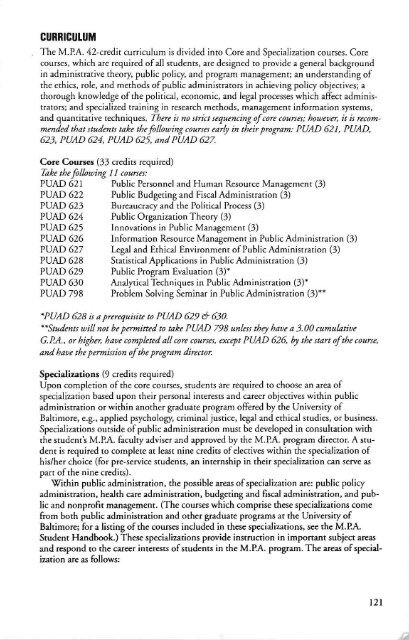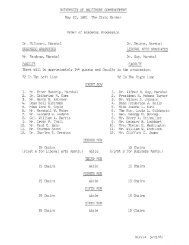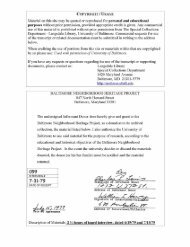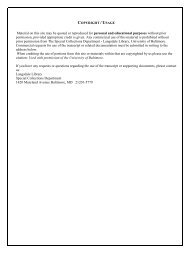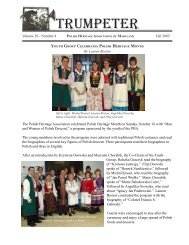2003-2005 - Special Collections - University of Baltimore
2003-2005 - Special Collections - University of Baltimore
2003-2005 - Special Collections - University of Baltimore
You also want an ePaper? Increase the reach of your titles
YUMPU automatically turns print PDFs into web optimized ePapers that Google loves.
CURRICULUM<br />
The M.P.A. 42-credit curriculum is divided into Core and <strong>Special</strong>ization courses. Core<br />
courses, which are required <strong>of</strong>all students, are designed to provide a general background<br />
in administrative theory, public policy, and program management; an understanding <strong>of</strong><br />
the ethics, role, and methods <strong>of</strong> public administrators in achieving policy objectives; a<br />
thorough knowledge <strong>of</strong> the political, economic, and legal processes which affect administrators;<br />
and specialized training in research methods, management information systems,<br />
and quantitative techniques. There is no strict sequencing <strong>of</strong>core courses; however, it is recommended<br />
that students take the following courses early in their program: PUAD 621, PUAD,<br />
623, PUAD 624, PUAD 625, and PUAD 627.<br />
Core Courses (33 credits required)<br />
Take the following 11 courses:<br />
PUAD 621 Public Personnel and Human Resource Management (3)<br />
PUAD 622 Public Budgeting and Fiscal Administration (3)<br />
PUAD 623 Bureaucracy and the Political Process (3)<br />
PUAD 624 Public Organization Theory (3)<br />
PUAD 625 Innovations in Public Management (3)<br />
PUAD 626 Information Resource Management in Public Administration (3)<br />
PUAD 627 Legal and Ethical Environment <strong>of</strong> Public Administration (3)<br />
PUAD 628 Statistical Applications in Public Administration (3)<br />
PUAD 629 Public Program Evaluation (3)*<br />
PUAD 630 Analytical Techniques in Public Administration (3)*<br />
PUAD 798 Problem Solving Seminar in Public Administration (3)**<br />
*PUAD 628 is a prerequisite to PUAD 629 & 630.<br />
**Students will not be permitted to take PUAD 798 unless they have a 3.00 cumulative<br />
C.P.A., or higher, have completed all core courses, except PUAD 626, by the start <strong>of</strong>the course,<br />
and have the permission <strong>of</strong>the program director.<br />
<strong>Special</strong>izations (9 credits required)<br />
Upon completion <strong>of</strong> the core courses, students are required to choose an area <strong>of</strong><br />
specialization based upon their personal interests and career objectives within public<br />
administration or within another graduate program <strong>of</strong>fered by the <strong>University</strong> <strong>of</strong><br />
<strong>Baltimore</strong>, e.g., applied psychology, criminal justice, legal and ethical studies, or business.<br />
<strong>Special</strong>izations outside <strong>of</strong> public administration must be developed in consultation with<br />
the student's M.P.A. faculty adviser and approved by the M.P.A. program director. A student<br />
is required to complete at least nine credits <strong>of</strong> electives within the specialization <strong>of</strong><br />
his/her choice (for pre-service students, an internship in their specialization can serve as<br />
part <strong>of</strong> the nine credits).<br />
Within public administration, the possible areas <strong>of</strong>specialization are: public policy<br />
administration, health care administration, budgeting and fiscal administration, and public<br />
and nonpr<strong>of</strong>it management. (The courses which comprise these specializations come<br />
from both public administration and other graduate programs at the <strong>University</strong> <strong>of</strong><br />
<strong>Baltimore</strong>; for a listing <strong>of</strong> the courses included in these specializations, see the M.P.A.<br />
Student Handbook.) These specializations provide instruction in important subject areas<br />
and respond to the career interests <strong>of</strong>students in the M.P.A. program. The areas <strong>of</strong>specialization<br />
are as follows:<br />
121


